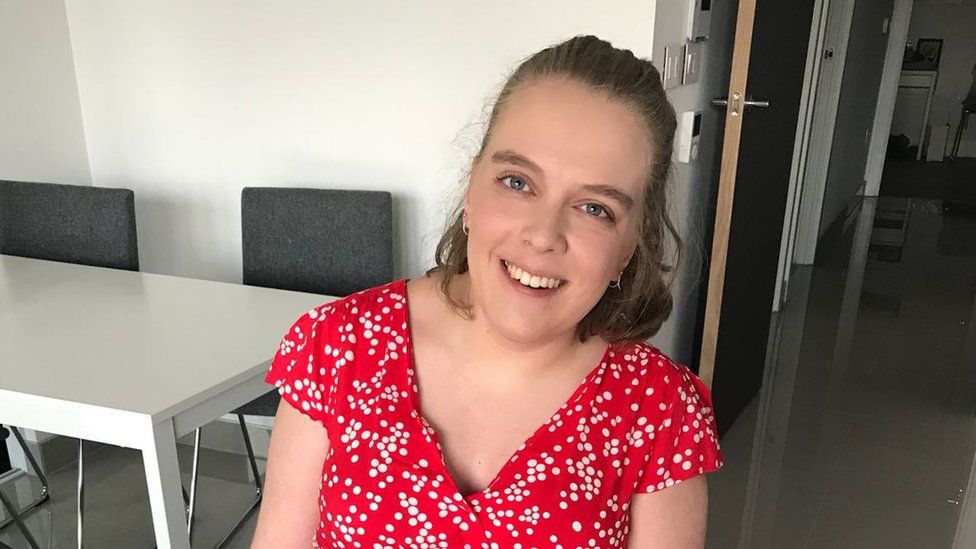Wheelchair user refused nightclub entry as music 'too rowdy'
- Published

A wheelchair user said she was refused entry to a nightclub by a bouncer who said the music was "too rowdy" for her.
Lucy Webster, 24, a BBC journalist, tried to get into Aquum - a wheelchair-accessible club in south-west London - on Saturday night.
After first being told by door staff that it was not safe, she was then told that the music was not suitable.
Aquum said it "deeply apologises" for what would seem to be an "error of judgement" by third-party contractors.
Lucy was in a bar with two friends - one who is her carer - in Clapham when they decided to continue on to a nightclub.
She said a quick internet search told her that nearby Aquum was wheelchair-accessible.
The club was busy when they arrived at around 01:30 GMT on Sunday morning and there was a small queue.
But door staff were letting in a steady stream of people, she said, until her group was stopped and taken aside.
'Accessible but not safe'
"This is where it starts to get odd," she said.
"The bouncer informs me that the physical access is fine, but the club is busy and he just wants to 'keep me safe'. 'I'm used to busy,' I say, 'I live in London. And anyway, I can look after myself'."
She said a doorwoman then came over "to tell me the music was 'too rowdy' for me - as if, as a disabled woman, I can only listen to girly pop and, presumably, very sad songs."
Lucy, who has cerebral palsy, responded by saying that was discrimination.
She was told it wasn't, because wheelchair users were often let into the club.
A heated discussion followed, which Lucy says included the door staff suggesting that she could go inside by herself to see that the club was unsuitable - despite earlier being told it was unsafe for her to go in.
She said her friends were getting angry but she decided it was better just to walk away.
"I just wanted to get out of there", she said, and they headed to a takeaway because "sometimes you just give up and get chicken".
Allow Twitter content?
This article contains content provided by Twitter. We ask for your permission before anything is loaded, as they may be using cookies and other technologies. You may want to read Twitter’s cookie policy, external and privacy policy, external before accepting. To view this content choose ‘accept and continue’.
"I ended up feeling pretty sad," she said. "You feel like you don't belong in that environment - even though you know that you do.
"It hasn't put me off because I'm stubborn, but it could put off others.
"Finding somewhere accessible on a night out is hard enough to start with - you're very limited where you can go. Even in London, it is genuinely hard to find somewhere to go."
Club promises action
Managing director of Aquum, Terry Georgiou, said: "I need to investigate this unfortunate incident further to ascertain all the facts, but it would seem that one of our third-party contractors has made an error of judgement on the evening in question for which I deeply apologise.
"I will be calling a meeting with our third-party supplier and appropriate action will be taken."
He added: "It was not our intention to cause any upset although I can see that it has... We will endeavour to ensure that such an incident never happens again."
He said Aquum was deliberately designed to be an inclusive venue and he had organised for his staff to have further training.
Lucy said: "I'm glad Aquum apologised and that they are retraining their staff. I don't think my friends and I will be going back but I hope other wheelchair users have better experiences in future."
Ceri Smith, campaigns manager at disability equality charity Scope, said businesses needed to work harder to prevent situations like this from happening.
"Disabled people deserve to be seen as more than their impairment or condition and should be able to enjoy a night out clubbing without encountering this type of bizarre and discriminatory behaviour.
"All too often disabled people tell us they face unfair accusations of being too drunk, or that their very presence makes them a fire hazard."
Have you had a similar experience? Tell us by emailing haveyoursay@bbc.co.uk
Please include a contact number if you are willing to speak to a BBC journalist. You can also contact us in the following ways:
- WhatsApp: +44 7555 173285
- Tweet: @BBC_HaveYourSay
- Send pictures/video to yourpics@bbc.co.uk
- Upload your pictures / video here
- Text an SMS or MMS to 61124 or +44 7624 800 100
- Please read our terms of use and privacy policy
- Published7 August 2018
- Published1 May 2018